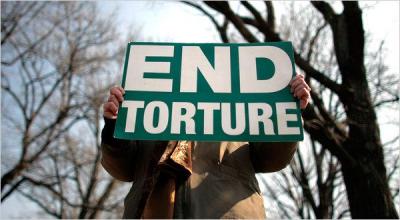
The Israeli government was under review this month, 2 - 4 May 2015, by the Committee Against Torture (CAT) at the United Nations in Geneva, which has received several shadow reports on Israeli violations of the UN Convention Against Torture from at least ten NGOs, including Addameer, Al-Haq, Adalah, Badil, Defense for Children International, Public Committee Against Torture – Israel, and Physicians for Human Rights. In a report submitted to the committee in 2012, the occupying state claimed to have made improvements in a number of areas relating to the convention, since it last submitted its report in 2007. Among these were improvement in prison conditions, opening investigation regarding cases of torture, regulation of Israel Security Agency (ISA) activities and training security personnel about the Torture Convention. However, the UN committee directed questions the Israeli delegation regarding its concerns. It quizzed Israel on its so-called “administrative detention” of those suspected of criminal and 'security offenses’ for an indefinite period and without being charged. The committee also said it was concerned about the high number of administrative detainees, including the eight children currently held.
The committee also requested information on the Israeli government policy of withholding the bodies of deceased Palestinians allegedly suspected of carrying out attacks. The committee asked the Israeli delegation to explain allegations that Palestinian detainees were subjected to different forms of torture and ill-treatment, including beatings, kicking, sleep deprivation, and placing detainees in stress positions. The committee also requested a reason that interrogations of “security suspects” not videotaped, and urged the Israeli delegation to videotape all interrogations for investigative purposes.
Additional allegations were made that Palestinian security detainees were kept in solitary confinement in cells that ranged from 2 to 6 square meters with no windows or access to daylight or fresh air. It said the location of Israel's prisons for security detainees was problematic because all but one was inside Israel (in contravention with international law which stipulates that prisoners and detainees must not be transferred to the occupying state). The committee underlined that this policy severely prevents family members from visiting their relatives inside the prisons, because most could not obtain permits to enter Israel from the West Bank or the Gaza Strip.
Addameer believes that the responses by the Israeli delegation to these points were not sufficient and did not adequately address the concerns of the committee, leaving many questions unanswered. The Israeli delegation stated that ISA procedures were in “full accordance” with the provision of the Torture Convention, and that the military courts function in accordance with international humanitarian law, in particular the Geneva Conventions. It added that thousands of security investigations had been conducted, but claimed the lack of indictments were due to lack of sufficient evidence. The delegation also failed to mention the number of interrogators were found guilty, and did not address what measures were taken against perpetrators of torture and ill-treatment. In response to a question about the increasing use of administrative detention, the Israeli delegate claimed that administrative detention is justified because of the presence of “violence” and that when violence stops, the Israeli government would stop using the policy.
Addameer looks forward to the concluding observations of the Committee Against Torture which are scheduled to be released on 13 May 2016.